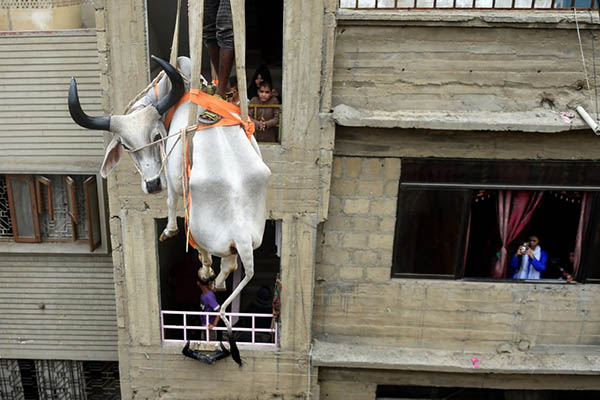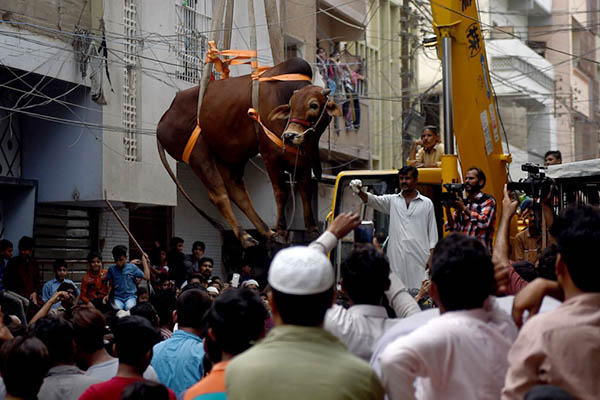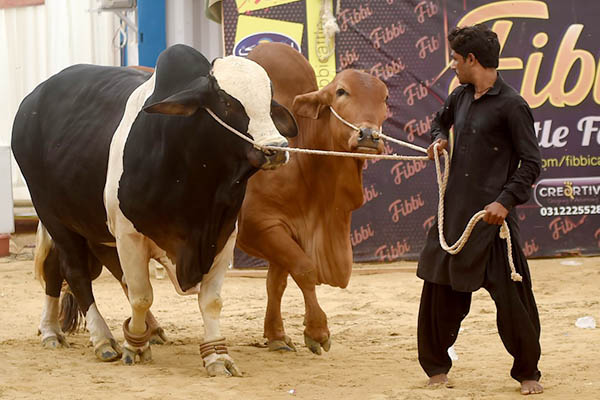 A crane in Karachi lifts a bull off the roof of a building in preparation for Eid-ul-Azha. Rizwan Tabassum—AFP
A crane in Karachi lifts a bull off the roof of a building in preparation for Eid-ul-Azha. Rizwan Tabassum—AFP A crane lifts a bull off the roof of a building in Karachi ahead of Eid-ul-Azha. Rizwan Tabassum—AFP
A crane lifts a bull off the roof of a building in Karachi ahead of Eid-ul-Azha. Rizwan Tabassum—AFP A trader walks with his bulls as he waits for customers ahead of Eid-ul-Azha. Rizwan Tabassum—AFP
A trader walks with his bulls as he waits for customers ahead of Eid-ul-Azha. Rizwan Tabassum—AFPCows in Pakistan go from roofs to plates for Eid-ul-Azha
Syed Ejaz Hassan’s annual ritual in Karachi has kicked off, which will see his cows transported from a roof to plates over the coming days ahead of next week’s Eid-ul-Azha holiday.
Muslims slaughter an animal—a goat, sheep, cow, or camel—on the annual festival in a ritual that stems from the story of the prophet Abraham, commanded by God to slaughter his beloved son Ismail. The meat is then distributed in equal parts to the poor, to relatives, and consumed by the family themselves.
In Karachi alone, nearly half a million cows, goats and camels will be sold or sacrificed during the holiday. But in the sprawling city of around 20 million, notorious for its gridlocked traffic, dense neighborhoods and woeful lack of green space, some roofs are transformed into temporary livestock pens ahead of Eid.
For Hassan—an entrepreneur—the roof of his four-floor building is the only place with enough space for the hay and troughs necessary to raise the half dozen cattle he hopes to sell for a profit before Eid. Once the animals are fattened, cranes are then used to bring the animals down from the rooftop to the streets—amusing pedestrians watching from below.
“We raised them with love and care,” says the 56-year-old Hassan. Even if it is necessary, “it hurts to sacrifice these animals which we have raised,” he adds.
While thousands of animals will be slaughtered next week to celebrate Eid, livestock sellers and customers still prefer to add a bit of flamboyance to their purchases, outfitting their animals with leg bracelets or flowers necklaces while others are dyed with henna. But amongst the lively and chaotic atmosphere in Karachi’s livestock markets are bitter negotiations.
Double-digit inflation, a depreciating rupee, and a range of new taxes in Pakistan this year have translated into much higher prices for animals this Eid. “[The farmers] are demanding exorbitant prices for cattle, almost double to that of last year,” says Syed Zeeshan. “Last year I bought an animal for Rs. 100,000, but I will have to pay Rs. 12,000 more for a smaller one,” complains another customer Mohammad Imran, a small business owner.
Despite the rise in prices, about 80,000 cows have already been sold at a single market in northern Karachi, according to administrator Zaki Abro. To distinguish their stock in the crowded market, sellers have in some cases have chosen names for their animals, including a recently sold bull called Trump, with the hope of attracting customers. “He has similar grandeur and distinction like the U.S. president,” says Abro.
